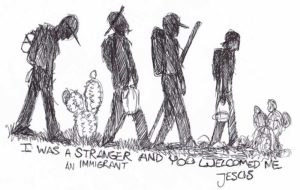“You promised that you would come, and actually made good your promise. But how, O Lord, how did You come? You did it by taking a human life as Your own. You became like us in everything: born of a woman, You suffered under Pontius Pilate, were crucified, died, and were buried. And thus You took up again the very thing we wanted to discard. You began what we thought would end with Your coming: our poor human kind of life, which is sheer frailty, finiteness, and death.
“Contrary to all our fond hopes, you seized upon precisely this kind of human life and made it your own. And You did this not in order to change or abolish it, not so that You could visibly and tangibly transform it, not to divinize it. You didn’t even fill it to overflowing with the kind of goods that men are able to wrest from the small, rocky acre of their temporal life, and which they laboriously store away as their meager provisions for eternity.
“No. You took upon Yourself our kind of life, just as it is.”
- Karl Rahner
Rahner’s observation is not the kind of thing that changes your life — we know that Jesus came and became human. The Incarnation — Christmas — has always been this story of God becoming finite, Creator becoming creature…
And yet, there is something in the phrase, “You took up again the very thing we wanted to discard” that makes me sit up straight. It turns out that I — like the Pharisees of Jesus’ time — am looking for a Messiah who will come with signs of His blessedness. Coming as a “poor human,” Jesus does not seem blessed; when Jesus cured a demon-possessed man, the Pharisees respond, “It is only by Beelzebul, the prince of demons, that this fellow drives out demons.” Jesus was so far from what was expected that when He did something remarkable, the response is to place Him in league with the devil because no other thought makes sense.
When Jesus became part of creation, He came poor and utterly unremarkable; His life was so cheap that Pilate killed Him rather than risk the crowd’s displeasure. Pilate was worried about the crowd, not this man who claimed to be God. “Then he released Barabbas for them; but after having Jesus flogged, he handed Him over to be crucified.” As Rahner writes, “You took upon Yourself our kind of life, just as it is.”
Jesus came to redeem us and to reveal God to us. “I made known to them your name and I will make it known, that the love with which you loved me may be in them and I in them.” And so the Gospels show an emphasis on revealing the Father. This life that He took upon Himself — subject to power and death — points to God. Jesus came to us poor because this is the way God is. Maybe Jesus was trampled because God refuses to do the trampling… —
Jesus would tell us what makes a person “blessed” — “Blessed are you who are poor, for the kingdom of God is yours. Blessed are you who are now hungry, for you will be satisfied. Blessed are you who are now weeping, for you will laugh. Blessed are you when people hate you, and when they exclude and insult you, and denounce your name as evil on account of the Son of Man. Rejoice and leap for joy on that day! Behold, your reward will be great in heaven.” Poverty, hunger, weeping – again, Jesus’ definition of blessing is “the very thing we wanted to discard.” Jesus proclaims as blessed exactly the things that we pray God will remove. But Jesus chose this very life, perhaps as an expression of who He is.
It is understood that Advent looks forward to Jesus’ final coming and backwards to His first coming. And, the language of these advents differ. The final coming has power and glory, clouds and angels; the first coming had poverty and ignominy, dismissal and rejection. And these appearances sound wildly different until we remember that Jesus spoke of His glorification in reference to the Cross. “[God’s] power is made perfect in weakness.” And thus, the 2nd coming can be recast in terms that look an awful lot like the 1st coming.
I suppose His second coming should look like the first — for it is the same God coming and coming back. The end-times symbolism makes the second coming seem clear, obvious. But, if Jesus’ second coming will look like His first coming, it will be easy to miss. A poor person or a human in a war zone is so much more common that the Lord might just blend in with the rest of us.
Maybe this is why Dorothy Day and Casa Juan Diego so frequently look to Matthew 25. “For I was hungry and you gave me food, I was thirsty and you gave me drink, a stranger and you welcomed me, naked and you clothed me, ill and you cared for me, in prison and you visited me.” Maybe seeing the poor is just a way to be ready for Jesus’ coming again.
Houston Catholic Worker, Vol. XLIII, No. 4, October-December 2023.


